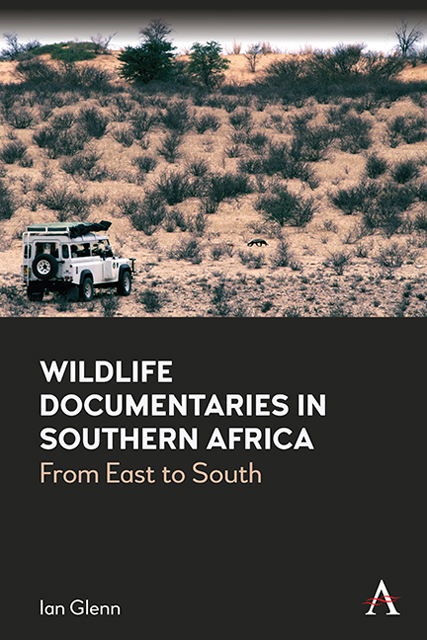Book contents
- Frontmatter
- Dedication
- Contents
- List of Figures
- Acknowledgements
- Introduction
- Chapter 1 What do the Critics Say?
- Chapter 2 A Theoretical Coalition?
- Chapter 3 Gone South: From East to Southern Africa
- Chapter 4 Private Lodges, Infrastructures and Guides
- Chapter 5 Going South: The Results
- Chapter 6 The Early History
- Chapter 7 The South Africans Enter the Game
- Chapter 8 Michael Rosenberg and Partridge Films
- Chapter 9 David and Carol Hughes
- Chapter 10 The Bartletts in the Namib, the Liversedges in Botswana
- Chapter 11 John Varty, Elmon Mhlongo and Londolozi
- Chapter 12 Richard Goss and Kim Wolhuter
- Chapter 13 Dereck and Beverly Joubert
- Chapter 14 Other Major Contributors
- Chapter 15 Going Live: Africam And Wildearth
- Chapter 16 Craig and Damon Foster
- Chapter 17 Must Love Animals?
- Chapter 18 The Social Turn
- Chapter 19 The Future of the Genre
- Chapter 20 The Influence of the Genre
- Conclusion
- Filmography
- Plates
- References
- Index
Chapter 5 - Going South: The Results
Published online by Cambridge University Press: 10 January 2023
- Frontmatter
- Dedication
- Contents
- List of Figures
- Acknowledgements
- Introduction
- Chapter 1 What do the Critics Say?
- Chapter 2 A Theoretical Coalition?
- Chapter 3 Gone South: From East to Southern Africa
- Chapter 4 Private Lodges, Infrastructures and Guides
- Chapter 5 Going South: The Results
- Chapter 6 The Early History
- Chapter 7 The South Africans Enter the Game
- Chapter 8 Michael Rosenberg and Partridge Films
- Chapter 9 David and Carol Hughes
- Chapter 10 The Bartletts in the Namib, the Liversedges in Botswana
- Chapter 11 John Varty, Elmon Mhlongo and Londolozi
- Chapter 12 Richard Goss and Kim Wolhuter
- Chapter 13 Dereck and Beverly Joubert
- Chapter 14 Other Major Contributors
- Chapter 15 Going Live: Africam And Wildearth
- Chapter 16 Craig and Damon Foster
- Chapter 17 Must Love Animals?
- Chapter 18 The Social Turn
- Chapter 19 The Future of the Genre
- Chapter 20 The Influence of the Genre
- Conclusion
- Filmography
- Plates
- References
- Index
Summary
Introduction
Carol Hughes, eventually perhaps habituated enough to trust me with a major revelation, one day said her husband David’s mantra was: ‘Not the BBC’. Why, given some of his most important films were made for them and that he had in part been trained by them, and given the general esteem in which the BBC’s Natural History Unit (NHU) and David Attenborough are held, might he have seen them as a negative principle? To understand the distinctive strengths of Southern African wildlife documentaries, it is useful to extract some of the NHU’s key operating principles as they were at once the source of its distinctive achievements but also point to some of their weaknesses and to the niches in the wildlife ecosphere the Southern Africans tried to fill.
The NHU
The histories of the BBC’s Natural History Unit examined earlier (Bright, Davies, Gouyon, Louson) illustrate the strengths of this institution but also suggest its corollary weaknesses. As I argued earlier, the weakness of the accounts of the NHU is both theoretical and historical in that they try to extract the NHU from the larger competitive broadcasting and production contexts. To try to write the history of the NHU without looking at what other broadcasters were doing or who was winning the ratings wars or industry accolades is to miss the way in which the field (to invoke Bourdieu) was developing and changing.
Let us put aside the greater home audience for most US productions and note that for much of the past half century, the NHU was not even the dominant wildlife broadcaster in the UK. Survival, with a strong component of Southern African material and with a South African born producer Mike Hay, was drawing much larger audiences (Gouyon 2019, 116). Partridge, as Davies pointed out, won the big competition prizes for most of the 1980s. And it didn’t stop there. Ellen Windemuth recalls in 2000 walking to collect the Golden Panda for the Foster brothers’ The Great Dance past rows of shocked BBC figures. If that didn’t happen in 2020 when Craig Foster won for My Octopus Teacher it was only because the event that year was virtual because of the COVID pandemic.
- Type
- Chapter
- Information
- Wildlife Documentaries in Southern AfricaFrom East to South, pp. 57 - 70Publisher: Anthem PressPrint publication year: 2022

